|
|
|
Sort Order |
|
|
|
Items / Page
|
|
|
|
|
|
|
| Srl | Item |
| 1 |
ID:
131624


|
|
|
|
|
| Publication |
2014.
|
| Summary/Abstract |
European Union (EU) interventions in conflict countries tend to focus on governance reforms of political and economic frameworks instead of the geopolitical context or the underlying power asymmetries that fuel conflict. They follow a liberal pattern often associated with northern donors and the UN system more generally. The EU's approach diverges from prevalent governance paradigms mainly in its engagement with social, identity and socio-economic exclusion. This article examines the EU's 'peace-as-governance' model in Cyprus, Georgia, Palestine and Bosnia and Herzegovina. These cases indicate that a tense and contradictory strategic situation may arise from an insufficient redress of underlying conflict issues.
|
|
|
|
|
|
|
|
|
|
|
|
|
|
|
|
| 2 |
ID:
131627
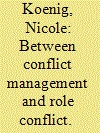

|
|
|
|
|
| Publication |
2014.
|
| Summary/Abstract |
This paper assesses the role of the European Union in the Libyan crisis (2011) and critically considers the implications for its evolution as an international security actor. Employing role theory, the paper reviews the historical development of the Union's security actorness and sheds specific light on the balance between self-conception and external expectations in the case of the Libyan crisis. Its central argument is that, despite external expectations and European narratives of a 'comprehensive power role', the Libyan crisis showed that the Union still acts in line with its traditional role as a civilian power. The inability to go beyond civilian power stemmed from internal dissonance on a potential hard power role and a corresponding lack of material capabilities. The growing gap between expectations about comprehensive actorness on the one hand and performance on the other is likely to damage the Union's future credibility as an international security actor.
|
|
|
|
|
|
|
|
|
|
|
|
|
|
|
|
| 3 |
ID:
131634
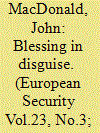

|
|
|
|
|
| Publication |
2014.
|
| Summary/Abstract |
This article examines the implications of Scottish independence for the UK's nuclear posture. It is argued here that a vote for independence will critically undermine this posture. Since the UK nuclear force operates entirely out of Scotland, and since the Scottish government continues to assert its intention to see nuclear weapons removed from an independent Scotland, it is overwhelmingly likely that a 'Yes' vote will prompt a demand for the drawdown of the UK nuclear force in Scotland. If it wished to maintain its nuclear capability, the UK government would then have to make alternative basing arrangements. It is argued here that a host of legal, financial and political difficulties may preclude any such relocation and that Downing Street may ultimately be left with little option but to surrender the UK's nuclear capability. This article concludes that far from weakening the UK, a surrendering of its nuclear posture would result in a stronger and more functional UK military footprint and would bolster the UK's standing in the international arena.
|
|
|
|
|
|
|
|
|
|
|
|
|
|
|
|
| 4 |
ID:
131636
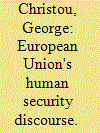

|
|
|
|
|
| Publication |
2014.
|
| Summary/Abstract |
The language of human security has been prominent in the European Union's (EU) official discourse for a number of years. However, whilst it has been promoted as a new approach for the EU in the development of its security and defence policy, the aim of this article is to assess the extent to which it actually features in the EU's contemporary strategic discourse and practice. It seeks to uncover where and how the concept is spoken within the EU's institutional milieu, how it is understood by the relevant policy-makers in the EU and the implication of this across key areas of human security practice. It is argued in the article that human security has not been embedded as the driving strategic concept for Common Security and Defence Policy (CSDP) in an era of crisis and change in Europe and beyond and that the prospects for this materialising in the near future are rather thin.
|
|
|
|
|
|
|
|
|
|
|
|
|
|
|
|
| 5 |
ID:
131632
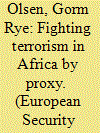

|
|
|
|
|
| Publication |
2014.
|
| Summary/Abstract |
The French intervention in Mali in early 2013 emphasizes that the decision-makers in Paris, Brussels, and Washington considered the establishment of the radical Islamist regime in Northern Mali a threat to their security interests. The widespread instability including the rise of radical Islamist groups in Somalia was perceived as a threat to western interests. It is the core argument of the paper if western powers decide to provide security in Africa, they will be inclined to use proxy instead of deploying own troops. Security provision by proxy in African means that African troops are doing the actual fighting and peacekeeping on the ground while western powers basically pay the costs, the logistics, and the training of local African troops. The paper concludes that the African Union Mission in Somalia (AMISOM) in Somalia and The African-led International Support Mission to Mali (AFISMA) in Mali are proxies for the USA and the European Union.
|
|
|
|
|
|
|
|
|
|
|
|
|
|
|
|
| 6 |
ID:
131635
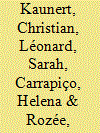

|
|
|
|
|
| Publication |
2014.
|
| Summary/Abstract |
This article examines how the governance of justice and internal security in Scotland could be affected by the outcome of the Scottish independence referendum in September 2014. The article argues that it is currently impossible to equate a specific result in the referendum with a given outcome for the governance of justice and internal security in Scotland. This is because of the complexities of the current arrangements in that policy area and the existence of several changes that presently affect them and are outside the control of the government and of the people of Scotland. This article also identifies an important paradox. In the policy domain of justice and internal security, a 'no' vote could, in a specific set of circumstances, actually lead to more changes than a victory of the 'yes' camp.
|
|
|
|
|
|
|
|
|
|
|
|
|
|
|
|
| 7 |
ID:
131629
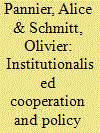

|
|
|
|
|
| Publication |
2014.
|
| Summary/Abstract |
What are the prospects for trilateral concord among Britain, France and Germany in terms of defence policies? Would more institutionalised links among them lead to more convergence of their defence policies? To answer these interrogations, this article investigates the relation between policy convergence and institutionalised cooperation, in particular by studying whether and when one is a prerequisite to the other. First, this article examines the extent to which these countries' defence policies have converged since the end of the cold war based on several indicators: their attitudes towards international forums, their defence budgets, the structure of their armed forces and their willingness to use force. Second, we study each of the bilateral relations between the three states to qualitatively analyse their degree of institutionalisation and the convergence of their defence policies. This article concludes that contrary to the arguments of many discussions, think-tank reports and political actors, there is no evidence that institutionalised cooperation leads to policy convergence as far as defence is concerned.
|
|
|
|
|
|
|
|
|
|
|
|
|
|
|
|
| 8 |
ID:
131633
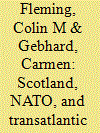

|
|
|
|
|
| Publication |
2014.
|
| Summary/Abstract |
This article explores the political and strategic implications of Scottish Independence for existing transatlantic security arrangements. It examines the potential institutional, legal and political obstacles Scotland might face during the transition to independence and discusses the specific challenges in the area of security and defence, including the nuclear issue and the question of what form an independent Scottish Defence Force (SDF) would need to take to allow and facilitate integration in transatlantic security structures. It argues that a number of strategic and political issues could be mitigated in the course of negotiations between Edinburgh and London. Moreover, Scotland's geostrategic position and political orientation make it an important prospective partner in international security cooperation across the Eastern Atlantic, High North and North Sea, which suggests that an advanced partnership with NATO, and eventually full membership, seems like an option that is both politically viable and more likely than any scenario that predicts seeing an independent Scotland (IS) outside these structures. This challenges some of the main strategic and security political arguments against independence and thus seeks to spark a debate about the realistic options for Scotland should it become independent after 2016.
|
|
|
|
|
|
|
|
|
|
|
|
|
|
|
|
|
|
|
|
|